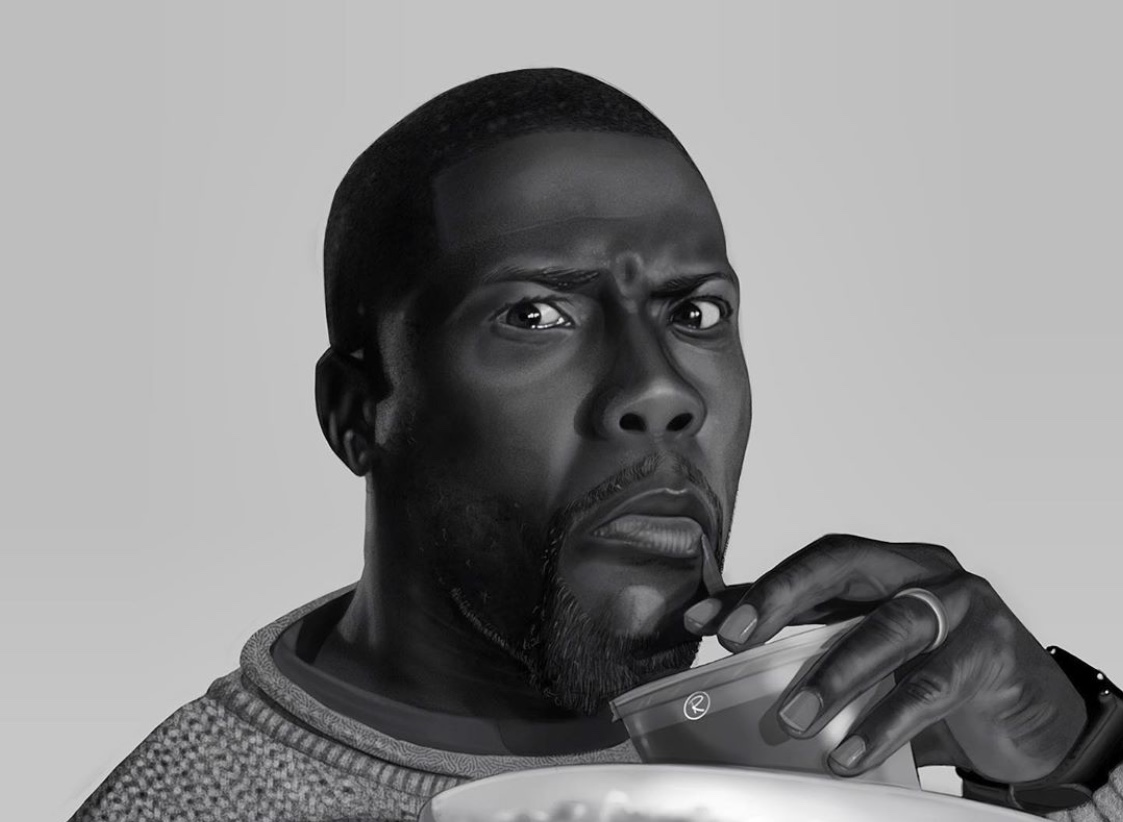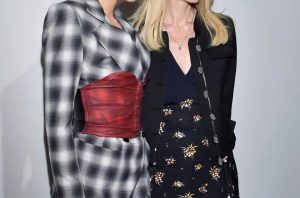Hart is a man of discipline. If you track his movements on social media — and with 32.7 million Twitter followers and 51.5 million Instagram fans, many do — you know he’s a physical fitness junkie. He rises every morning at 5:30 to hit the gym, and last August he ran 35 miles in a relay that took him from Mount Hood to the Oregon coast. He routinely shares pictures of himself in mid-crunch or hoisting barbells in the air.
“You can’t expect to give 100% if you’re not in a physical place to give 100%,” says Hart, 37.
Right now, the actor and comedian is arguably the hardest-working person in show business. He’s appeared in nearly a dozen movies since 2013, many of them in leading roles and most of them box office hits. That’s to say nothing of the grueling stand-up tours that put him on the road for weeks at a time.
Kevin Darnell Hart was born on July 6, 1979 to Nancy Hart, a single mother, and brought up in one of the toughest sections of the City of Brotherly Love. His father, Henry Witherspoon, missed much of Hart’s childhood. He was in and out of jail, and an addict. The drugs, and escalating parental screw-ups, such as the time Witherspoon dropped Hart off at the wrong school, caused his mom to limit his visits.
“We come from a f—ed-up situation,” says Robert Hart, Kevin’s older brother. “We come from the worst living conditions.”
When Hart performs stand-up, he treats his father as a jester, arriving coked up to cheer his son at spelling bees or giving his kids another family’s dog when they wanted a puppy. But there was a darker side to Witherspoon. In the book, Hart recounts how his father broke into his mother’s house to steal money. Another time, he robbed Robert Hart’s barbershop and crashed his car.
“He didn’t escape any of it — jail, drugs, addictions, ruining your family to a point where my mom didn’t want me and my brother to be around him,” Hart says. “Seeing the stuff firsthand. Seeing the reality behind drugs and addiction, and what it can really do to a person, that’s why I don’t do drugs. I learned what I shouldn’t be doing from what my dad did.”
Hart says his father is now sober and the two have reconciled. At some point, Hart decided it was important for his two young children, Heaven and Hendrix, to know their grandfather.
“It takes too much time and energy to keep hate alive,” Hart says. In return, Witherspoon makes an effort with the children.
“He’s as good as he can be,” Hart says. “He’s very much in their lives. He talks to them. He sends them messages. He Facetimes. He’s serious about making his presence felt.”
If Hart has conflicted feelings about his father, there’s no ambiguity in his love for his mother. It was she, Hart says, who gave him his work ethic. A computer analyst at the University of Pennsylvania, she told her sons to set goals and achieve them. And she lived out her maxim.
“She was forever in school,” Hart remembers. “She was always trying to get a new level within her education — a new master’s or a new degree. She was constantly pushing to be the best version of herself.”
When Hart decided he wanted to do stand-up, his mother agreed to pay his rent for a year as he worked to get noticed. He’d commute daily from Philadelphia to the comedy clubs in New York, hitching rides or taking the bus from his home in the afternoon and returning at four in the morning. As he opened up about his personal life, he could feel the audience leaning in and responding.
“In the beginning, I was trying to be versions of what I saw or what other people were doing,” he remembers. “It was all, What’s the new shtick? ‘Oh, man, everyone’s coming onstage and they’re using music. I need to give them some music or I need to be loud.”
The first piece that clicked centered on a fight he’d had with his girlfriend.
“I was like, ‘I called the cops on her,’” Hart says. “‘Officer, I called you here because she put her hands on me and you guys need to do something about it.’ It was funny because all the things a woman would say, I was saying.”
Dave Becky, Hart’s manager, remembers watching a tape of an early performance at Carolines Comedy Club and knowing that he had to sign the comic.
“You could just tell he was a star,” Becky says. “It was self-deprecating stuff about not being the macho guy. Every word out of his mouth was funny.”
It took longer for Hollywood to catch on. One break after another failed to turn Hart into the Next Big Thing. There was the 2001 Judd Apatow-directed pilot “North Hollywood,” about a group of aspiring actors sharing a house, which never got picked up, and a series of other failed pilots. When Hart made it on the air in 2004 with “The Big House,” an ABC comedy he created about a rich man who loses his fortune, the network pulled the plug after six low-rated episodes. It wasn’t until “Think Like a Man,” a romantic comedy with the comic as a wisecracking divorcee, opened to $33.7 million in 2012 that studios took notice.
As he suffered professional setbacks, Hart turned to stand-up. He obsessively toured, hitting clubs on a nightly basis. Inspired by how comic Dane Cook had become a Twitter juggernaut, Hart set about building his own social-media Rolodex.
“When he was out on the road he was collecting those emails, he was getting those comment cards, and building a database,” says Becky. “There weren’t a lot of comedians doing that. He was mixing his unique comic voice with a strong business sense.”
Though she’d supported her son’s show-business ambitions, Nancy Hart never came to see him onstage.
“She was religious,” Hart says. “There was going to be drinking and alcohol and smoking stuff. She didn’t want to go around that mess. She didn’t like to be in environments that were not conducive to her spiritual growth.”
Nancy Hart was so invested in her son’s success that she swore her family to secrecy after learning she had terminal cancer in 2007. Hart had just been cast in “Fool’s Gold,” a romantic comedy with Matthew McConaughey and Kate Hudson that required him to be in Australia. If he knew she was sick, Nancy Hart worried her son would turn down the job. Robert Hart remembers his mother swearing him to silence by saying, “I need him to be able to go forward because I see him doing great things.”
Hart only knew his mother was gravely ill a few weeks before her death. It left him shattered. Nancy Hart had never talked much to her son about his career. However, when he was cleaning out her house, he came across a box filled with newspaper and magazine clippings of his interviews, as well as videos of his television appearances and movies.
“Anything I’d ever done, she had it,” Hart says. “She never missed anything.”
Hart’s movies, which include the “Ride Along” series and “Central Intelligence,” have collectively grossed nearly $1.5 billion domestically. In an age when superhero franchises have supplanted well-known actors as the main driver of box office success, Hart’s is one of the rare names above the title that guarantees ticket sales.
“He’s a legitimate, bankable movie star,” says Ron Meyer, vice chairman of NBCUniversal and a friend of the comic. “He’s one of the few stars left that brings people into theaters.”
That’s why he can command $10 million a film and why, as he did for his 2016 concert special “What Now?,” he can sell out a nearly 70,000-seat football stadium. The popular appeal has made Hart rich, but he’s not interested in just cashing studios’ checks. He wants to be a mogul.
“Think comedic Oprah,” Becky says.
“He’s going to build companies and invest in companies and do the things that Oprah and LeBron James do, where they don’t just do their craft — they create industries.”
As he relaxes in the Miami sunshine on that spring afternoon, nursing a Jack and Coke, Hart acknowledges that he has Oprah Winfrey-style ambitions. He’s befriended the talk-show icon and
considers her to be one of a group of business mentors, along with Jay Z and Tyler Perry, whom he turns to for advice and support.
“I’m a student,” Hart says. “It’s about getting their nod of approval and knowing I’m going in the right direction.”
To get to the top, Hart’s been investing in his own material. He shouldered the $10 million cost of producing “What Now?” and was rewarded when the concert film went on to gross $24 million. It’s part of a larger strategy that’s seen the comic retain the rights to all of his stand-up specials except 2009’s “I’m a Grown Little Man.” It’s why he’s developing more of his own projects through his Hartbeat Prods. company. “Night School,” an upcoming comedy about a group of students studying for the GED, was co-written by Hart. He’ll produce and star in it. As part of his empire building, he has gone into branding, signing an endorsement deal with Nike and becoming a pitchman for and investor in Tommy John underwear.
“I want to own it,” Hart says. “I want that last name Hart, when all’s said and done, to mean so much.”
As an actor, Hart wants to keep stretching
As open as he is about his difficult childhood or broken marriage, there are topics he won’t touch. Comedians have feasted on President Donald Trump, lampooning everything from his comb-over to his fractured syntax, but Hart won’t pile on. His act eschews politics.
“When you jump into that political realm you’re alienating some of your audience,” he says. “The world today, it’s really not a laughing matter. It’s serious. I don’t want to draw attention to things I don’t have nice things to say about.”
In his book, Hart reminisces about the thrill he got seeing Eddie Murphy’s “Raw” as a child. Murphy, still in his 20s, would glide across the stage with a rock-star swagger in a tight leather suit. The two men have become friends as Hart’s star has ascended. But despite that outsize, early success, Murphy hasn’t done stand-up for three decades.
“He told me one time, ‘It’s like cold water: I know I can swim, but that water’s so cold,” Hart says. “Nobody wants to jump in the cold water. Once you get in the water, you’re fine, but the initial jump in is the hardest thing ever.”
With two kids, hit movies and a burgeoning media empire, does Hart ever think about hanging up the microphone?
I’m going to say no because I love stand-up so much, but you never know what life is going to do to you,” Hart says. “I’d love to say I’m going to have this energy forever, but I may get tired.”
SLAYLEBRITY STATS
Kevin Hart in 2020 has a gigantic bank account. The 40 yr old hardwork has certainly paid off big time.He is estimated to have a networth of between $150-$200 million.
Kevin Hart don’t play with making moolah
He Mastered the Social Media Game Early
Hart was one of the very first comedians to leverage social media in a way to maximize his profits and capitalize on his ever-growing following. This was never made more clear than during the Sony leak in 2014: That December, news outlets published leaked emails from Sony execs slamming Hart for charging studios for tweets promoting his own movies, as well as others from shared studios. Hart fired back on Instagram, writing, “Knowing your self worth is extremely important people…I worked very hard to get where I am today. I look at myself as a brand and because of that I will never allow myself to be taking advantage of. I own my brand…I make smart decisions for my brand…I protect my brand…which is why I’m able to brush ignorance off of my shoulder and continue to move forward. I refuse to be broken people…with that being said, its now time for me to get back to building this empire that I’ve always dreamed of!”
He Made More Money Than Jerry Seinfeld in 2016
Hart made a whopping $87.5 million in 2016, largely thanks to touring arenas around the world and endorsement deals with H&M, Hyundai and Foot Locker, as well as a role in the highly profitable Secret Life Of Pets. (For perspective, the second highest-paid comedian in 2016 was Jerry Seinfeld, who made $30 million less than Hart’s massive earnings.) He was one of an elite group of comedians to sell out Madison Square Garden, with peers only including Andrew Dice Clay (the first to ever do it—twice), comic Louis C.K., Bill Burr, Chris Rock, Eddie Murphy, Aziz Ansari, Dane Cook, Amy Schumer and Russell Peters.
“Only a few comedians are capable of sports arenas,” Gary Bongiovanni, editor of Pollstar, told Forbes. “Kevin Hart is very much the exception: He is doing arenas everywhere; his comedy transcends the borders of this country.” He added, “Hart sold over a million tickets in a year, I don’t know how long it’s been since a comedian did that.” Part of what made Hart’s tour so profitable is that comedians typically don’t have elaborate stage sets or pyrotechnics, meaning production costs are much, much lower than other types of arena performances like concerts. That all translates to more money in the headliner’s pocket. Hart performed more than 100 shows in 2016, each grossing about $1 million. In addition to his live shows, Hart’s standup documentary film, Kevin Hart: What Now? reportedly grossed more than $11.7 million in its first week of theater release, totaling about $23 million domestically.
He Works fucking HARD!
While a lot of performers would have rested on their laurels or retired quite comfortably, Hart remained a workhorse the following year. The Philadelphia-born star amassed a staggering $32.5 million in 2017, according to Forbes, thanks to his roles in blockbusters including Jumanji: Welcome 2 The Jungle and Central Intelligence and endorsements including Tommy John underwear and Nike. While it’s unknown his precise salary for Jumanji: Welcome 2 The Jungle, Forbes estimates that it was in the seven-figure range up front, plus back-end. He was the second highest-paid comedian of that year.
He explained to Forbes in February 2018, upon announcing a partnership with both the NBA and Mountain Dew, “I am not in the position in life where I need to go take a money grab. I’m more about the partnership—a brand that I can grow, evolve and do something special with. One thing I don’t ever want to do is NASCAR myself out; for people to say, ‘He’s got a Samsung deal and now an AT&T deal and then a new loafer deal and then a Wrangler deal?’”
Still, he admitted, “To sit here and say money doesn’t play a part in some deals, you wouldn’t be telling the truth. But more important for me is what if this brand becomes the biggest ever, what if the campaign becomes the most talked about thing ever—my name and my brand would be attached to that.” In addition to his literal big deals, however, Hart says that his heart will always be true to touring to perform standup comedy, which remains his biggest passion of all. “There is a high level of love for what I do,” he said of comedy tours. “That’s my craft, that’s how it started. I would never turn my back on stand up; it opened up the doors I walk through now.”
Kevin Hart’s success has nothing to do with luck
Kevin Harts 10 Steps to Success





